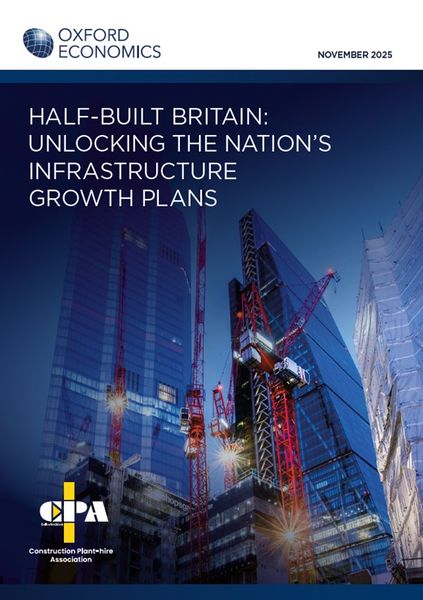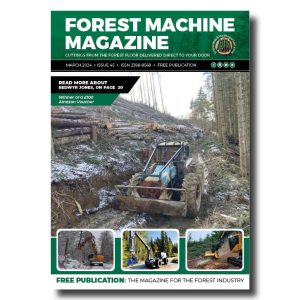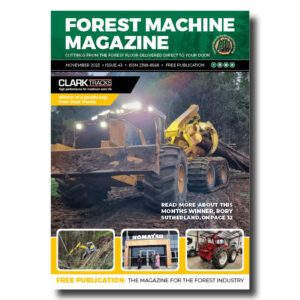Half-Built Promises: New Report Reveals Cracks in UK’s Construction Pipeline
A major new report by Oxford Economics for the UK’s Construction Plant-hire Association (CPA) warns that Britain’s £530 billion construction and infrastructure pipeline is “starting to crack”, with skills shortages, falling investment and delivery delays threatening to derail government growth plans.

-
That’s a remarkable amount of work hours for a single machine, the Norcar 600 owned by Erkki Rinne is taken well care of, it even has the original Diesel engine.
-
Kieran Anders is a forestry contractor working in the lake district. His work involves hand cutting and extracting timber using a skidder and tractor-trailer forwarder.
-
It is not possible to eliminate chain shot, but there are simple steps that can be taken to reduce the risk.
-
Arwel takes great pride in the fact that the mill has no waste whatsoever, “the peelings are used for children’s playgrounds, gardens and for farm animals in barns in the winter and the sawdust has multiple uses in gardens and farms as well.
-
Timber hauliers need to encourage young blood in, and also look after the hauliers we have, we need make the sector a safe and positive place to work.
FIND US ON
The report warns that Britain’s construction engine is stalling under the combined strain of skills shortages, weak investment and chronic delivery delays – leaving flagship projects, from new hospitals and homes to airport expansions, at risk of grinding to a halt.
However, it also highlights the opportunity for government and industry to work together to unlock investment and close the productivity gap – a step that could generate up to £315 billion in long-term economic growth, helping fund national priorities without adding to public debt.
The analysis warns that while ministers talk of “getting Britain building”, much of the pipeline “lacks the workforce, certainty or funding to move beyond announcements.” Businesses that provide the machinery and skilled operators underpinning construction say they cannot plan or invest without predictable workloads, leaving delivery capacity “dangerously thin”.
The report paints a stark picture:
- The UK needs 250,000 additional construction workers to deliver planned projects – yet nearly half a million are due to retire in the next 15 years.
- 44 per cent of firms report labour shortages restricting activity – the worst figure of any major UK sector.
- Apprenticeship completion has slumped to 53 per cent, while pay for young workers in construction has fallen below wage rates in the retail sector.
- Construction productivity has declined 0.1 per cent a year since 1997, leaving output per worker below 1990s levels.
- Only 14 per cent of major government projects are rated on track, and less than half the National Infrastructure Pipeline has confirmed costs or funding.
- Funding certainty plunges from 68 per cent this year to just 33 per cent by 2030, creating what Oxford Economics calls “a crisis of confidence” for investors and contractors.
The report identifies Britain’s productivity problem as primarily a capital problem. Decades of under-investment in machinery, technology and infrastructure have left the UK falling behind its competitors. Whereas manufacturing productivity has risen by 3.5% a year since the late 1990s, construction has gone backwards.
Steven Mulholland, CEO of the Construction Plant-hire Association, said:
“This report is a call to action for ministers. Britain’s construction pipeline is cracking under the strain of unrealistic targets, uncertain funding and a shrinking workforce.
“Unless the Government restores confidence and fixes the fundamentals, the next decade will be defined by half-built promises and rising costs.
“The plant-hire sector is one of the most capital-intensive in the economy, with our members shouldering much of the investment risk needed to keep Britain building. With stable policy and predictable pipelines, we can channel private capital into public infrastructure without adding to national debt.
“If ministers match our willingness to invest with clarity and confidence, we can turn ambition into action and build the growth, jobs and prosperity Britain needs.”
The report warns that “announcements are outpacing delivery capacity”, with too few projects fully costed or shovel-ready. It highlights that construction productivity has fallen consistently because investment in capital equipment and infrastructure has lagged behind peer economies. In contrast, countries such as Germany and France, which have maintained stable capital pipelines, have seen sustained productivity growth despite similar demographic pressures.
Oxford Economics notes that while government capital spending is set to rise by 3.6% annually to 2029-30, much of this increase is already absorbed by energy transition costs and existing liabilities – leaving transport, housing and local infrastructure underfunded.
To break that cycle, the CPA has submitted a package of policy proposals to the Treasury ahead of the Autumn Budget to stabilise delivery and restore business confidence across the construction supply chain. The plan includes:
- Fix the pipeline – publish a fully costed update of the National Infrastructure Pipeline with secured funding beyond 2028.
- Reverse the rise in employer National Insurance, easing labour-cost pressures across construction supply chains.
- Extend full expensing to leased assets, allowing hire firms to reinvest £1.3 billion a year in new capital equipment.
- Maintain the current Fuel Duty rate, protecting SMEs hit by the loss of red-diesel relief.
- Retain Business Property Relief, preventing succession-related closures of family-run firms.
- Reform the Growth and Skills Levy to give employers full flexibility and fund all SME apprenticeships
The CPA argues that the Government can still harness the strength of the construction sector to deliver its growth ambitions – with every £1 spent generating £3 in wider economic value. By working hand in glove with industry, Britain can build the world-class infrastructure needed to drive growth and prosperity.
Read the full report here ;
Sign up for our free monthly newsletter here
Contact forestmachinemagazine@mail.com to get your products and services seen on the world’s largest professional forestry online news network.
#homeoflogging #writtenbyloggersforloggers #loggingallovertheworld
Written by loggers for loggers and dedicated solely to the equipment used in forestry operations.







